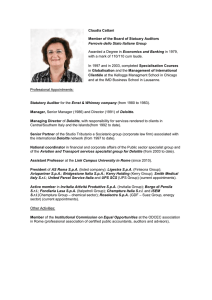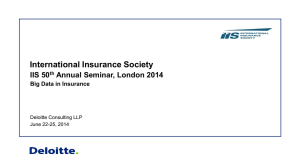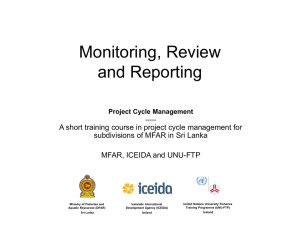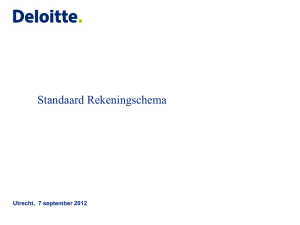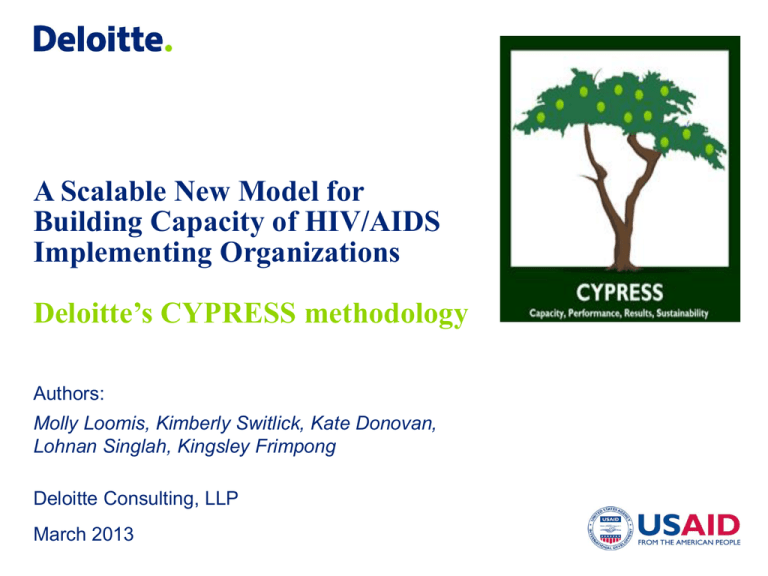
A Scalable New Model for
Building Capacity of HIV/AIDS
Implementing Organizations
Deloitte’s CYPRESS methodology
Authors:
Molly Loomis, Kimberly Switlick, Kate Donovan,
Lohnan Singlah, Kingsley Frimpong
Deloitte Consulting, LLP
March 2013
Overview of the Strengthening Integrated Delivery of
HIV/AIDS Services (SIDHAS) Project
SIDHAS Project’s 3 Key Results
1. Increased access and improved coverage of high quality comprehensive HIV/AIDS
treatment, care and related services through improved efficiencies in service delivery.
2. Improved quality and integration of HIV/AIDS services.
3. Improved stewardship by Nigerian institutions for the provision of high quality
comprehensive HIV/AIDS services.
Deloitte’s Scope of Work
Build capacity of Nigerian counterparts… …in specific areas
• State Ministry of Health and other
• Leadership and stewardship
agencies
• Coordination and communication
• Hospitals
• Change management
• Community-based Organizations
• Human capital and workforce
(CBOs)
development
• Local Government Authorities (LGAs)
• financial management and analysis
1
Deloitte’s CYPRESS methodology is the foundation for
the capacity building approach in SIDHAS (Continuous
Process Improvement)
CYPRESS is grounded in
theory and strategic
concepts:
• Goal theory
• Agency theory
• Informational
asymmetry
• Change
management
• Performance
management
© copyright Deloitte 2013
CYPRESS is operationalized to shift the focus from
capacity to performance
Counterparts set targets, shifting the power dynamic and
aligning interests and goals
Analysis helps address information asymmetry between
TA provider and counterpart regarding counterpart’s
current and potential performance
Design phase helps promote alignment between activities and
expected changes in performance
Counterparts begin to institutionalize change and
performance management to catalyze greater action,
motivation, accountability, and sustainability
Performance management helps maintain focus on what
matters and facilitate evidence-based decisions and better
return on investments
Preparation
Implementing the CYPRESS methodology in Nigeria
Oriented SIDHAS project staff to the CYPRESS methodology
and tools.
Tailored CYPRESS process and tools for each counterpart
group and vetted them with the counterparts.
Helped counterparts set new or review existing performance
targets, and define benchmarks towards those targets.
Helped counterparts benchmark their current capacity and
performance using the tailored maturity model and
benchmarking tool.
Helped counterparts create capacity development and
performance improvement workplans.
Currently helping counterparts implement capacity building
events to address prioritized capacity gaps and performance
drivers.
Initial Results: output and emerging outcomes
Outputs demonstrate methodology can be taken to scale
• Initiated methodology for 160 counterparts entities in 18 states (85 state
agencies, 15 CBOs, 60 LGAs)
• Assisted 160 partners to develop their capacity building plans
• Conducted workshop in 9 states to build counterparts’ workplanning skills
and finalize performance targets, current state reports, and capacity
building plans and current state reports
Emerging outcome-level themes suggest a paradigm shift
• New attention to performance targets
• More defined vision of leading stage of maturity and how to get there
• Strong sense of ownership over the process
• More empowered to advocate, take control, and hold themselves
accountable
5
In counterparts’ own words
This is a wake-up call to take on our
responsibility to ensure that our systems
and processes are strong and sustainable.
National AIDS/STI Control Program
representative
We’re not used to looking at performance
in this way. I am going to go back and
make sure we have performance targets.
We can even use those targets to
advocate for more resources.
State Health Commissioner
This [M&E piece of the methodology] is
not just numbers, but actually evaluating
the change that has really happened, and
knowing that it happened as a result of
capacity building.
CBO representative
6
There is duplication in what we and other
organizations are doing. We need to bring
all implementing partners together so we
can coordinate better.
State HIV/AIDS and STI Control
Program representative
[Before CYPRESS] it was like we were in
a vehicle that was going to an unknown
destination. Our eyes were closed. But
now we know exactly where we need to
go…we see what we can do for ourselves,
even without waiting for the [state]
government.
Local Government Authority
We will use this methodology with others
in the state.
Bauchi State Ministry of Women
Affairs and Child Development
Copyright © 2012 Deloitte Development LLC. All rights reserved.
CYPRESS is relevant across a wide range of settings, sectors, and
organization types
Armenia
Tax Reform
Government
Cyprus
Economic Growth
Partnerships
Ukraine
Local Capacity
Development Summit
Kyrgyzstan
Economic Policy
Central Level
CYPRESS
by the Numbers
Afghanistan
Health Economics
Ministry of Health
Bangladesh
Clean Energy
Government
12 countries
14 projects
6 sectors
>200
Thailand
Regional
Development
Mission Asia
counterparts
8 types of
counterparts
Ghana
Neglected Tropical
Disease
Ministry of Health
7
South Sudan
Government &
NGOs
Nigeria
HIV/AIDS
State & Local Gov
Hospitals, NGOs
Mozambique
Health Systems
Strengthening
Ministry of Health &
Social Welfare
Kenya
Medical
Supply Chain
Parastatal
Kenya
Eastern Africa
Grain Council
Regional
Organization
South Sudan
Eastern Africa
Grain Council
Regional
Organization
Copyright © 2012 Deloitte Development LLC. All rights reserved.
Challenges and Lessons Learned: Nigeria and Globally
CYPRESS can be implemented at scale with a wide range of counterparts
• The methodology is flexible and can be tailored to diverse contexts
Deep change takes time
• Counterpart learning increases are often incremental and
counterparts can reach a stage of change saturation
Counterpart leadership matters
• A high level of leadership commitment appears to be one of the
pivotal factors for effective change
Technical Assistance providers’ perspective matters
• The capacity to performance paradigm shift should occur in both
project staff and counterparts
8
Challenges and Lessons Learned (continued)
Multiple perspectives provide a richer view
• Output and outcome level changes should be measured from an
internal (subjective) and external (objective) perspective
Interventions can yield rapid results
• Even a short project (e.g. 1 yr.) can lead to outcome level changes in
capacity and performance
CYPRESS develops cultures of performance
• formal and informal feedback indicate increases in counterparts’
stewardship in terms of commitment, engagement, and action.
9
About Deloitte
This publication contains general information only and is based on the experiences and research of Deloitte practitioners. Deloitte is
not, by means of this publication, rendering business, financial, investment, or other professional advice or services. This publication
is not a substitute for such professional advice or services, nor should it be used as a basis for any decision or action that may affect
your business. Before making any decision or taking any action that may affect your business, you should consult a qualified
professional advisor. Deloitte, its affiliates, and related entities shall not be responsible for any loss sustained by any person who
relies on this publication.
As used in this document, "Deloitte" means Deloitte Consulting LLP, a subsidiary of Deloitte LLP. Please see
www.deloitte.com/us/about for a detailed description of the legal structure of Deloitte LLP and its subsidiaries. Certain services may
not be available to attest clients under the rules and regulations of public accounting.
Copyright © 2013 Deloitte Development LLC, All rights reserved.

